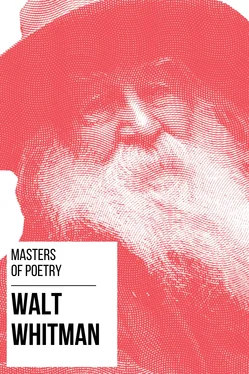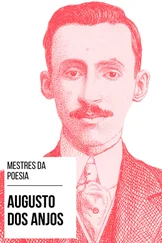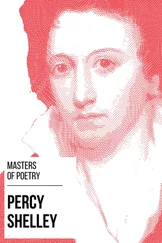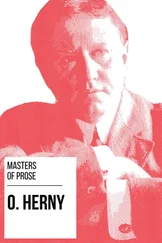It is on these grounds that Whitman, first of all, is an artist. He has the artist temperament. His whole life was that of a man who lives to ideal ends,—who lived to bestow himself upon others, to extract from life its meaning and its joy.
Whitman has let himself go, and trusted himself to the informal and spontaneous, to a degree unprecedented. His course required a self-reliance of the highest order; it required an innate cohesion and homogeneity, a firmness and consistency of individual outline, that few men have. It would seem to be much easier to face the poet's problem in the old, well-worn forms—forms that are so winsome and authoritative in themselves—than, to stand upon a basis so individual and intrinsic as Whitman chose to stand upon. His course goes to the quick at once. How much of a man are you? How vital and fundamental is your poetic gift? Can it go alone? Can it face us in undress?
Never did the artist more cunningly conceal himself; never did he so completely lose himself in the man, identifying himself with the natural and spontaneous; never emerging and challenging attention on his own account, denying us when we too literally seek him, mocking us when we demand his credentials, and revealing himself only when we have come to him upon his own terms.
The form the poet chose favored this self-revelation; there is nothing, no outside conscious art, to stand between himself and his reader. "This is no book," he says: "who touches this touches a man." In one sense Whitman is without art,—the impression which he always seeks to make is that of reality itself. He aims to give us reality without the usual literary veils and illusions,—the least possible amount of the artificial, the extrinsic, the put-on, between himself and his reader. He banishes from his work, as far as possible, what others are so intent upon,—all atmosphere of books and culture, all air of literary intention and decoration,—and puts his spirit frankly and immediately to his readers. The verse does not seem to have been shaped; it might have grown: it takes no apparent heed of externals, but flows on like a brook, irregular, rhythmical, and always fluid and real. A cry will always be raised against the producer in any field who discards the authority of the models and falls back upon simple Nature, or upon himself, as Millet did in painting, and Wagner in music, and Whitman in poetry.
Whitman's working ideas, the principles that inspired him, are all directly related to life and the problems of life; they are democracy, nature, freedom, love, personality, religion: while the ideas from which our poets in the main draw their inspiration are related to art,—they are literary ideas, such as lucidity, form, beauty.
Much light is thrown upon Whitman's literary methods and aims by a remark which he once made in conversation with Dr. Bucke:—
"I have aimed to make the book simple,—tasteless, or with little taste,—with very little or no perfume. The usual way is for the poet or writer to put in as much taste, perfume, piquancy, as he can; but this is not the way of nature, which I take for model. Nature presents us her productions—her air, earth, waters, even her flowers, grains, meats—with faint and delicate flavor and fragrance, but these in the long run make the deepest impression. Man, dealing with natural things, constantly aims to increase their piquancy. By crossing and selection he deepens and intensifies the scents and hues of flowers, the tastes of fruits, and so on. He pursues the same method in poetry,—that is, strives for strong light or shade, for high color, perfume, pungency, in all ways for the greatest immediate effect. In so doing he leaves the true way, the way of Nature, and, in the long run, comes far short of producing her effects."
More light of the same kind is thrown upon his methods by the following passage from the preface to the first edition of his poems in 1855.
"To speak in literature," he says, "with the perfect rectitude and insouciance of the movements of animals, and the unimpeachableness of the sentiment of trees in the woods and grass by the roadside, is the flawless triumph of art." And again: "The great poet has less a marked style, and is more the channel of thoughts and things without increase or diminution, and is the free channel of himself. He swears to his art, I will not be meddlesome; I will not have in my writing any elegance, or effect, or originality, to hang in the way between me and the rest like curtains. I will have nothing hang in the way, not the richest curtains. What I tell, I tell for precisely what it is. Let who may exalt or startle or fascinate or soothe, I will have purpose, as health or heat or snow has, and be as regardless of observation. What I experience or portray shall go from my composition without a shred of my composition. You shall stand by my side and look in the mirror with me."
But in view of the profound impression Whitman's work has made upon widely different types of mind on both sides of the Atlantic, and in view of the persistent vitality of his fame, the question whether he is inside or outside the pale of art amounts to very little. I quite agree with the late Mrs. Gilchrist, that, when "great meanings and great emotions are expressed with corresponding power, literature has done its best, call it what you please."
That Whitman has expressed great meanings and great emotions with adequate power, even his unfriendly critics admit. Thus Professor Wendell, in an admirable essay on American literature, says that "though Whitman is uncouth, inarticulate, and lacking in a grotesque degree artistic form, yet for all that he can make you feel for the moment how even the ferry-boats plying from New York to Brooklyn are fragments of God's eternities." In the same way Mr. William Clark, his British critic and expounder, says that he is wanting in discrimination and art, "flings his ideas at us in a heap," etc., and yet that the effect of his work is "to stir our emotions, widen our interests, and rally the forces of our moral nature."
It seems to me that a man who, through the printed page, can do these things, must have some kind of art worth considering. If, through his impassioned treatment of a prosy, commonplace object like a ferry-boat, he can so dignify and exalt it, and so fill it with the meanings of the spirit, that it seems like a part of God's eternities, his methods are at least worth inquiring into.
The truth is, Whitman's art, in its lack of extrinsic form and finish, is Oriental rather than Occidental, and is an offense to a taste founded upon the precision and finish of a mechanical age. His verse is like the irregular, slightly rude coin of the Greeks compared with the exact, machine-cut dies of our own day, or like the unfinished look of Japanese pottery beside the less beautiful but more perfect specimens of modern ceramic art.
For present purposes, we may say there are two phases of art,—formal art and creative art. By formal art I mean that which makes a direct appeal to our sense of form,—our sense of the finely carved, the highly wrought, the deftly planned; and by creative art I mean that quickening, fructifying power of the masters, that heat and passion that make the world plastic and submissive to their hands, teeming with new meanings and thrilling with new life.
Formal art is always in the ascendant. Formal anything—formal dress, formal manners, formal religion, formal this and that—always counts for more than the informal, the spontaneous, the original. It is easier, it can be put off and on.
Formal art is nearly always the gift of the minor poet, and often of the major poet also. In such a poet as Swinburne, formal art leads by a great way. The content of his verse,—what is it? In Tennyson as well I should say formal art is in the ascendant. Creative art is his also; Tennyson reaches and moves the spirit, yet his skill is more noteworthy than his power. In Wordsworth, on the other hand, I should say creative art led: the content of his verse is more than its form; his spiritual and religious values are greater than his literary and artistic. The same is true of our own Emerson. Poe, again, is much more as an artist than as a man or a personality.
Читать дальше












